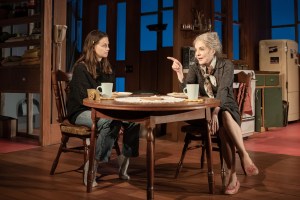Marsha Norman’s 1981 play won the Pulitzer Prize for Drama on its debut, and remains one of the best plays I have read on the page, long before I saw it acted.
The story of Jessie Cates, an epileptic in a rural America which wrote her off years ago, on her last evening before her suicide, should be full of tension as she explores her life and, specifically, her difficult relationship with ageing mothet Thelma.
This revival from Hampstead Theatre is part of their celebration of plays from their past six decades. It is a curious choice in some ways, but also a very apt piece to illustrate how sometimes death can be welcomed when you have just “had enough”.
Rebecca Night and Stockard Channing are a curious fit for daughter and mother: neither really say what they mean, and there is no love or compassion here, just the brisk efficiency in which Jessie imparts information about the milkman, grocery bill, and where to find the thumbtacks.
Although other characters are mentioned by name (brother Dawson, fussy friend Agnes, ex-husband Cecil, druggie son Ricky, and the silent dad who Jessie idolised but who thought of her, it transpires, as “a runt”) this is very much a play for two voices.
Channing’s Thelma is both bewildered and steely in her resolve to keep Jessie with her. She moves around in a fog, but never attempts to understand that her daughter’s decision is not about her. Night’s Jessie is resolute, stoic, calm.
In Roxana Silbert’s production, matters are left deliberately unresolved while the two women remain remote from each other. Even when Thelma agrees to make a childhood favourite, cocoa, Jessie is across the room, detached from proceedings.
‘Night, Mother is not helped in this production by a set by Ti Green which overburdens the space. The kitchen, the sofa, the shelves all seem too open for a play which feels increasingly claustrophobic. The tension and emotion just aren’t there.
Once Jessie brings down her father’s gun (in the first scene) and her countdown begins, we should see her world shrinking with her. Here, we don’t, although I admired the tightly tangled roof which may have been set to comment on the mental conflict in the house below.
Despite my slight disappointment in this version, ‘Night, Mother is still an intriguing piece of work, and tackles a difficult subject from an angle which must have been challenging forty years ago. You may want to check out the film version of 1986 if you come across it, with Anne Bancroft and Sissy Spacek.
‘Night, Mother runs at the Hampstead Theatre’s main house until 4 December. Book your tickets here.
Image credit: Marc Brenner



